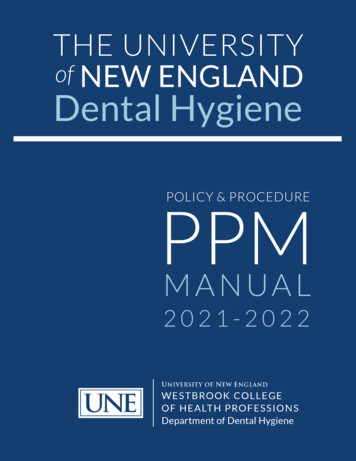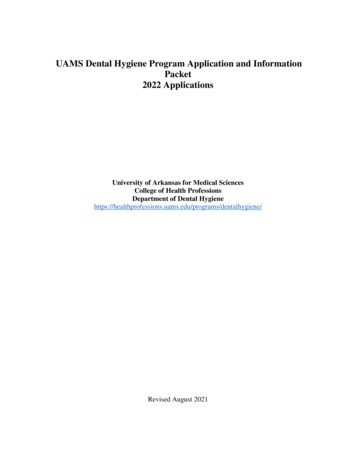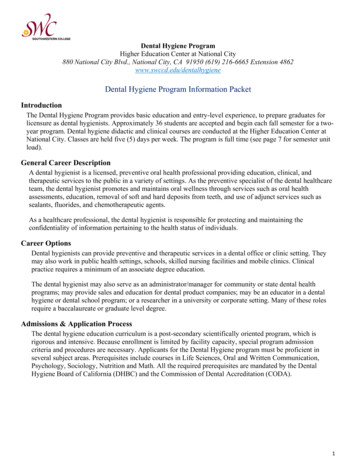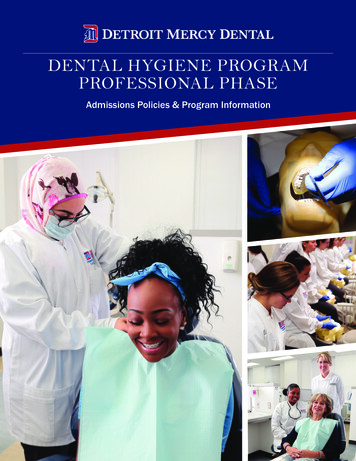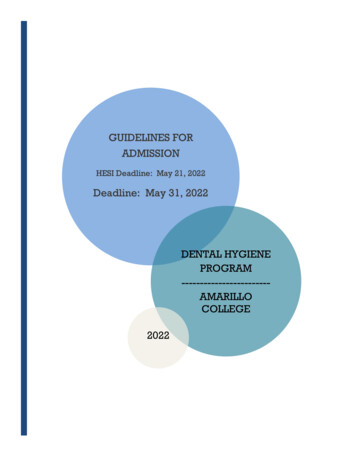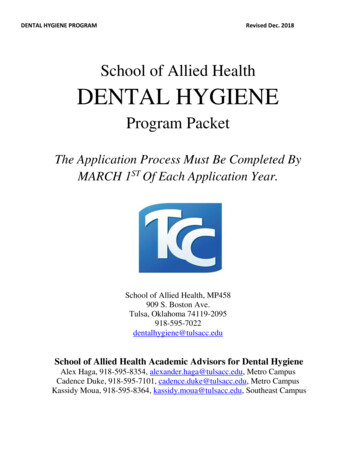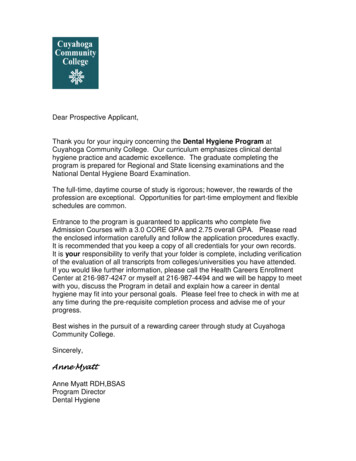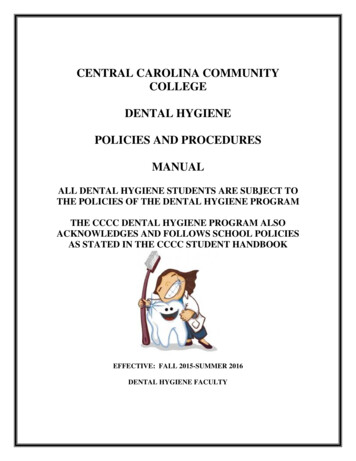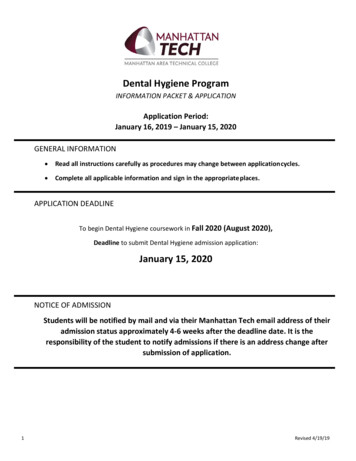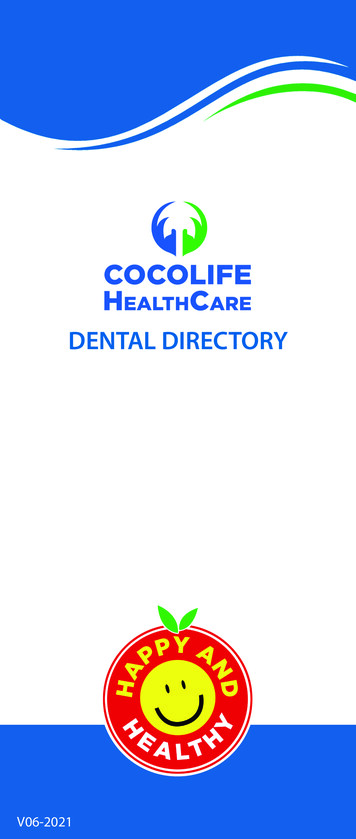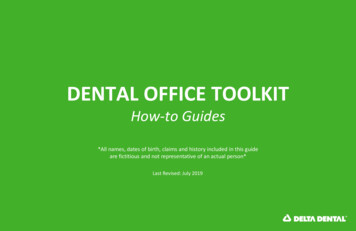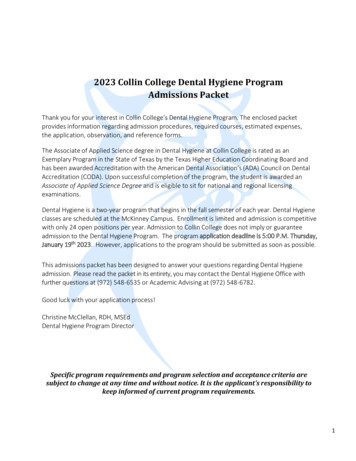
Transcription
2023 Collin College Dental Hygiene ProgramAdmissions PacketThank you for your interest in Collin College’s Dental Hygiene Program. The enclosed packetprovides information regarding admission procedures, required courses, estimated expenses,the application, observation, and reference forms.The Associate of Applied Science degree in Dental Hygiene at Collin College is rated as anExemplary Program in the State of Texas by the Texas Higher Education Coordinating Board andhas been awarded Accreditation with the American Dental Association’s (ADA) Council on DentalAccreditation (CODA). Upon successful completion of the program, the student is awarded anAssociate of Applied Science Degree and is eligible to sit for national and regional licensingexaminations.Dental Hygiene is a two-year program that begins in the fall semester of each year. Dental Hygieneclasses are scheduled at the McKinney Campus. Enrollment is limited and admission is competitivewith only 24 open positions per year. Admission to Collin College does not imply or guaranteeadmission to the Dental Hygiene Program. The program application deadline is 5:00 P.M. Thursday,January 19th 2023. However, applications to the program should be submitted as soon as possible.This admissions packet has been designed to answer your questions regarding Dental Hygieneadmission. Please read the packet in its entirety, you may contact the Dental Hygiene Office withfurther questions at (972) 548-6535 or Academic Advising at (972) 548-6782.Good luck with your application process!Christine McClellan, RDH, MSEdDental Hygiene Program DirectorSpecific program requirements and program selection and acceptance criteria aresubject to change at any time and without notice. It is the applicant’s responsibility tokeep informed of current program requirements.1
Dental Hygiene Career DescriptionThe dental hygienist is a licensed dental health care professional who specializes in periodontaltherapy and oral health education. A broad based education in biological sciences and humanities aswell as dental sciences and clinical techniques prepare the graduate for work in private practice andcommunity settings. The dental hygienist is a member of the dental health team, along with thedentist, dental assistant and dental laboratory technician. The dental hygienist may be employed inprivate dental offices, dental product sales, public schools, or other institutions under thesupervision of a licensed dentist. Alternative practice settings include hospitals, clinics, federalagencies and local and state health departments. The dental hygienist is in demand nationally,statewide and locally, and opportunities are available on a full-time and part-time basis foremployment. Hygienists are also required to satisfy 12 CE hours per year.In the state of Texas, the dental hygienist is licensed to perform primary preventive proceduresincluding: Perform oral health care assessments that include reviewing patients’ health history, dentalcharting, oral cancer screening, and taking and recording blood pressure; Expose, process, and interpret dental radiographs; Remove plaque and calculus (soft and hard deposits) from above and below the gumline; Apply cavity-preventive agents such as fluorides and sealants to the teeth; Teach patients proper oral hygiene techniques to maintain healthy teeth and gums; Counsel patients about plaque control and developing individualized at-home oralhygiene programs Counsel patients on the importance of good nutrition for maintaining optimal oral health.2
Employment Opportunities*Working in a private dental office continues to be the primary place of employment for dentalhygienists. For today’s dental hygiene professional, there are many other career pathways to explore aswell. Never before has there been more opportunity for professional growth. How and where you worktoday is up to you. Let your dental hygiene education and experience open doors to YOUR career pathand consider the possibilities.Dental hygienists in a clinical role assess, diagnose, plan, implement, evaluate and document treatmentfor prevention, intervention and control of oral diseases, while practicing in collaboration with otherhealth professionals. Corporate dental hygienists are employed by companies that support the oralhealth industry through the sale of products and services. Leaders throughout the dental industry oftenemploy dental hygienists due to their clinical experience and understanding of dental practice.Community Health programs are typically funded by government or nonprofit organizations. Thesepositions often offer an opportunity to provide care to those who otherwise would not have access todental care. Research conducted by dental hygienists can be either qualitative or quantitative.Quantitative research involves conducting surveys & analyzing the results, while qualitative researchmay involve testing a new procedure, product, or theory for accuracy or effectiveness. Dental Hygieneeducators are in great demand. Colleges and universities throughout the U. S. require dental hygieneinstructors who use educational theory and methodology to educate competent oral health careprofessionals. Corporations also employ educators who provide continuing education to licensed dentalhygienists. Dental hygienists in administrative positions apply organizational skills, communicateobjectives, identify and manage resources, and evaluate and modify programs of health, education andhealth care. By using imagination and creativity to initiate or finance new commercial enterprises, dentalhygienists have become successful entrepreneurs in a variety of businesses.** The median annual wage for dental hygienists was 77,810 in May 2021. The median wage is thewage at which half the workers in an occupation earned more than that amount and half earned less.The lowest 10 percent earned less than 60,100, and the highest 10 percent earned more than 100,200. Employment of dental hygienists is projected to grow 11 percent from 2020 to 2030, muchfaster than the average for all occupations. The demand for dental services will increase as thepopulation ages. As the large baby-boom population ages and people keep more of their original teeththan did previous generations, the need to maintain and treat teeth will continue to drive demand fordental care. Studies linking oral health and general health, and efforts to expand access to oral hygieneservices, will continue to drive the demand for preventive dental services. As a result, the demand for alldental services, including those performed by hygienists, will increase. In addition, demand for dentalhygienists is expected to grow as state laws increasingly allow dental hygienists to work at the top oftheir training, and they effectively become more productive.*Source: American Dental Hygienists’ Association, on the Internet at https://www.adha.org/professionalroles (visited May 16, 2022)**Source: Bureau of Labor Statistics, U.S. Department of Labor, Occupational Outlook Handbook, DentalHygienists, on the Internet at ts.htm (visited April 18,2022).3
Collin College Dental Hygiene Program GoalsThe Collin College Dental Hygiene Program will prepare the graduate to perform clinicalprocedures, dental nutritional counseling, identify potential health problems and understand thephysical and clinical aspects of treatment. The student will study the physical structures of thehead, neck and teeth, recognize patients’ health conditions, understand medications and theireffects and understand the disease process.The Dental Hygiene Program goals reflect the institution’s core values. They are listed as follows: Create an active learning environment that integrates the principles of evidence-basedresearch while promoting critical thinking, self-evaluation, innovation, creativity, andlifelong learning.Provide clinical experiences that promote a commitment to community service and civicinvolvement while responding to the oral health needs of a diverse community.Provide students with the knowledge and clinical competence required to provide current,comprehensive dental hygiene services in a variety of settings for individuals of all ages andstages of life including those with special needs.To treat each patient/client with dignity and respect.Create an environment that promotes the importance of wellness in both student andpatient/clients.To understand the relevance and integration of preventive dental hygiene services in anevolving health care system.Collin College affirms as its mission the commitment to provide, within the resources available,educational programs and services that meet the individual and community needs. The district seeksto promote lifelong individual growth and excellence through strengthening the intellect, characterand capabilities of all students. The college acts as a resource to local, state, national andinternational communities by providing education, cultural and civic programs and services.Collin College core values are as follows:Service and involvementCreativity and innovationAcademic excellenceDignity and respectIntegrity4
Collin College Dental Hygiene ProgramApplication RequirementsAdmission to the Dental Hygiene Program is very selective. Admission to the college does not guaranteeadmission to the Dental Hygiene Program. The following items must be received by 5:00 P.M. Thursday,January 19, 2023, in order to have a completed application that is eligible for review. Completed application form.Official copies of ALL college transcripts, including Collin College transcripts mailed directly to theDental Hygiene Program Director. Applicant is responsible for ordering all transcripts, as theDental Hygiene Department DOES NOT have access to obtain this information for our applicants.Proof of completed prerequisite course requirements (transcripts)o Anatomy and Physiology I (BIOL 2401)o Anatomy and Physiology II (BIOL 2402)o Introduction to Chemistry I (CHEM 1405)o Microbiology (BIOL 2420)Prerequisites must be completed within five years prior to the application deadline. Coursestaken more than 5 years (no earlier than Spring 2018) prior to the time of application deadlinewill not be accepted.The applicant is responsible for ensuring the accurate transfer of courses prior to submitting anapplication (See Academic Advising for assistance). Please note that the lack of prior approvalwill delay the processing of your application, and may affect your acceptance into the program.It is recommended that you apply to Collin College and submit all transcripts from any othercolleges attended. Once accepted, request a Transfer Credit Evaluation be completed on yourbehalf. Run and print a Degree Audit and include it with your mailed application packet.Completed HESI exam results. All HESI exams must be taken between June 1, 2022 and December16, 2022, in order to apply by the application deadline. THERE WILL BE NO EXCEPTIONS. HESIresults will be accessed by our department. Do not submit with application. Please use this linkto register: vation Hours-16 hours are required and must be completed within the last 12 months with alicensed dental hygienist. Observations completed with a DDS will not be considered.Submit a TYPED 1-2 page essay that discusses why you have selected Collin College DentalHygiene.Submit two professional reference forms: Completed by an employer or educator.Photograph of the applicant only (Size 4”X6”, does not have to be a professional photograph)It is recommended that you have tracking information on all mailed requirements to ensure delivery.5
Collin College Admissions RequirementsGeneral transfer admissions requirements to Collin College: Complete an application online at https://apply.collin.edu.Official transcript from all regionally accredited institutions of higher education.Provide proof of exemption/waiver of TSI.Provide proof of meningitis vaccination, if needed.Complete mandatory campus safety training.The Points System and Selection CriteriaAdmission into the Dental Hygiene program is extremely competitive, with 24 positions availableper year. In order to make a fair and accurate decision, we utilize the following point system torank our applicants. Applicants will be ranked and selected based on the number of pointsearned. The Collin College Dental Hygiene Program reserves the right to make changes toadmission criteria and program information as circumstances require. In the event of a tie forfinal slots into the program, qualified applicants will be considered based upon their interviewpoints.1. Prerequisite Courses (Maximum of 16 points)Applicants can be awarded a maximum of 16 points for completion of the prerequisite coursesAnatomy and Physiology I, Anatomy and Physiology II, Introduction to Chemistry or GeneralChemistry and Microbiology. These courses must be completed within five years (no earlier thanSpring 2018) prior to the application deadline. Every applicant is responsible for ensuring theaccurate transfer of courses prior to submitting an application (See Academic Advising forassistance).Please note that the lack of prior approval will delay the processing of your application, and mayaffect your acceptance into the program.A in lecture course 3 pointsB in lecture course 2 pointsC in lecture course 1 pointA in lab 1 pointB in lab 1 pointC in lab 0 pointsIf a course is four credit hours and has only one grade, that grade will apply for both thelecture and the lab. See additional information below regarding honors course points.6
2. HESI Exam (Maximum 15 points)(HESI may only be taken once per application year.) Scores 90% and above will receive 3 points per category Scores from 80-89% will receive 2 points per category Scores 75-79% will receive 1 point per categoryThe HESI is composed of a battery of tests that measures abilities, skills, knowledge, andattitudes important for successful performance of students in the allied health educationprograms. The Dental Hygiene Program only considers scores from the following battery offive tests: Anatomy and PhysiologyChemistryMathReading ComprehensionVocabulary and General Knowledge3. 16 Observation Hours (2 points)Applicants will be required to complete 16 hours of observing a Registered DentalHygienist. Hours must be within 12 months of submitting application.4. Typed Essay (Maximum 3 points)All applicants must submit a typed, well-developed, 1-2 page essay discussing why you havechosen to apply to the Collin College Dental Hygiene Program.5. Professional References (2 points) Two professional reference forms are included in thispacket and are to be completed by individuals who can attest to your character andaptitude as a potential dental hygiene student. Dental hygiene admission requires twocompleted references mailed directly by the person providing the reference to the DentalHygiene Program. References should be completed by an employer or educator. If anemployer or educator reference is not available, the reference must be from someonethat has acted in a supervisory position.6. Honors Courses-BONUS points for BIOL 2401 AND/OR BIOL 2402(Possibility of an additional 2 points if BIOL 2401 and BIOL 2402 are taken at Collin Collegeand a grade of “A” or “B” is earned)A in BIOL 2401 1 pointB in BIOL 2401 1 pointA in BIOL 2402 1 pointB in BIOL 2402 1 point7
Maximum Basic Requirement Points: 38 POINTSMaximum Honors Bonus Points:2 POINTSTotal Possible Application Points:40 PointsInterview (Maximum 5 points)Once all applications are received and reviewed, an invitation with the selectioncommittee will be extended to a select few via phone. Invitation to the interview doesnot guarantee acceptance into the Collin College Dental Hygiene program. Eachapplicant will receive a score for their interview, which will be added to your overallapplication score. Not every applicant will receive an invitation for an interview. Pleasedo not call or email to schedule an interview.Total Possible Application Points: 40 PointsMaximum Interview Points:5 PointsTotal Possible Admissions Points: 45 PointsApplications are due by 5:00 PM Thursday, January 19th 2023, for consideration of acceptanceinto the Fall 2023 entry class. Applicants will be notified by mail, within six to eight weeks afterapplication deadline.Professionalism Statement: Professionalism is of the utmost importance for our program. If an applicantdisplays unprofessional behavior at any time during the application process, their application will berevoked immediately.8
Additional Dental Hygiene Program RequirementsUpon Formal Acceptance1. All student must be certified in CPR, the American Heart Association for the BLS for HealthcareProviders: Adult, Child and Infant with AED. CPR online courses will not be accepted. Completionof this requirement is mandatory prior to admittance into Preclinical Dental Hygiene (DHYG 1431).Certification must be maintained through graduation and for licensure.2. The student will complete formal training in Infection Control Procedures. No student will beallowed to deliver patient services in any setting until he/she has been instructed on an annualbasis in infection control (as per OSHA/ HIPAA guidelines, HB300 every 2 years) and has masteredmaterial on safety/universal precautions with satisfactory accuracy. Following mastery of infectioncontrol skills and under faculty supervision, each student will be expected to provide services forpatients with health deviations, including patients with HIV/HBV and other bloodborne/infectiousdiseases, as part of routine clinical/lab curriculum experiences.3. The student must maintain a minimum overall GPA of 2.5 (75 course average) once enrolled as adental hygiene student.4. The student will be required to complete a drug screening and background check.Requirements for dental hygiene licensure as set by the Texas State Board of DentalExaminers (TSBDE) define that individuals be “of good moral character”. All individualsaccepted into the program must meet licensure eligibility requirements. Information receivedfrom the background check or drug screening may result in dismissal from the program. Inaddition to a drug screening following admissions, there may be additional random orincident drug screenings while enrolled in the curriculum.5. The student must be in good health and upon acceptance, furnish physical, dental and eyeexamination records. Forms will be provided by the dental hygiene department, onceaccepted into the program.6. Annual TB testing is required by the dental hygiene department and clinical enrichment sitesper OSHA guidelines. Dental hygiene students are required to show evidence of two skintests within the same year OR the results of a QFT, IGRA or T-spot test prior to the start ofthe second year.7. Annual influenza vaccine is required by the dental hygiene department and clinicalenrichment sites per OSHA guidelines.9
8. This section applies to all students enrolled in health-related courses, which will involve directpatient contact in medical or dental care facilities. This includes all medical interns, residents,fellows, nursing students, and others who are being trained in medical schools, hospitals, andhealth science centers listed in the Texas Higher Education Coordinating Board’s list of highereducation in Texas and students attending two-year and four-year colleges whose coursework involves direct patient contact regardless of the number of courses taken, number ofhours taken, and the classification of the student. In addition, the State of Texas requires theapplicant, upon formal acceptance, to provide proof of the following immunizationrequirements:The following immunizations are required for clinical placement eligibility. These immunizationsalign with the requirements by the Texas Department of State Health Services (TDSHS). Clinicalpartners may require additional vaccinations. Clinical placement is contingent on complying withthe immunizations requirements of our clinical partners, this includes the COVID vaccine foremployees and other populations.Students must have all of the following vaccinations before they may engage in the courseactivities:(1) Tetanus-Diphtheria Vaccine: Students must show receipt of one dose of tetanusdiphtheria-pertussis vaccine (Tdap). In addition, one dose of a tetanus-containing vaccinemust have been received within the last ten years. Td vaccine is an acceptable substitute,if Tdap vaccine is medically contraindicated.(2) Measles, Mumps, and Rubella Vaccines:(A) Students born on or after January 1, 1957, must show, prior to patientcontact, acceptable evidence of vaccination of two doses of a measles-containingvaccine administered since January 1, 1968 (preferably MMR vaccine).(B) Students born on or after January 1, 1957, must show, prior to patientcontact, acceptable evidence of vaccination of two doses of a mumps vaccine.(C) Students must show, prior to patient contact, acceptable evidence of onedose of rubella vaccine.(3) Hepatitis B Vaccine: Students are required to receive a complete series of hepatitis B vaccineor show serologic confirmation of immunity to hepatitis B virus prior to the start of direct patientcare. This series may commence following acceptance into the dental hygiene program, but atiter must be completed and documentation of immunity (positive titer) must be submitted tothe dental hygiene department by December 1st of the fall semester of the first year, prior toproviding direct patient care.(4) Varicella Vaccine. Students are required to have received two doses of varicella(chickenpox) vaccine.10
Limited Exceptions(1) Notwithstanding the other requirements in this section, a student may be provisionally enrolled inthese courses if the student has received at least one dose of each specified vaccine prior to enrollmentand goes on to complete each vaccination series as rapid as medically feasible in accordance with theCenters for Disease Control and Prevention's Recommended Adult Immunization Schedule as approvedby the Advisory Committee on Immunization Practices (ACIP). However, the provisionally enrolledstudent may not participate in coursework activities involving the contact described in subsections (a)and/or (d) of this section until the full vaccination series has been administered.(2) Students, who claim to have had the complete series of a required vaccination, but have not properlydocumented them, cannot participate in coursework activities involving the contact described insubsections (a) and/or (d) of this section until such time as proper documentation has been submittedand accepted.(3) The immunization requirements in subsections (b) and (d) of this section are not applicable toindividuals who can properly demonstrate proof of laboratory confirmation of immunity or laboratoryconfirmation of disease. Vaccines for which this may be potentially demonstrated, and acceptablemethods for demonstration, are found in §97.65 of this title (relating to Exceptions to ImmunizationRequirements (Verification of Immunity/History of Illness).Such a student cannot participate in coursework activities involving the contact described in Subsection(a) of this section until such time as proper documentation has been submitted and accepted. Students may be provisionally enrolled for up to one semester to allow students time to attendclasses while obtaining the required vaccines and acceptable evidence of vaccination. Polio vaccine is not required. Students enrolled in health-related courses are encouraged toascertain that they are immune to poliomyelitis. Students cannot be provisionally enrolled without at least one dose of measles, mumps,and rubella vaccine if direct patient contact will occur during the provisional enrollmentperiod. Students must show, prior to patient contact, acceptable evidence of vaccination of onedose of rubella vaccine. Students born on or after January 1, 1957, must show, prior to patient contact, acceptableevidence of vaccination of one dose of mumps vaccine. Students shall receive two doses of varicella vaccine unless the first dose was receivedprior to thirteen years of age.11
Exceptions to Immunization Requirement(Verification of Immunity/History of Illness)(a)Serologic confirmations of immunity to measles, rubella, mumps, hepatitis A,hepatitis B, or varicella, are acceptable. Evidence of measles, rubella, mumps,hepatitis A, or hepatitis B, or varicella illnesses must consist of a laboratoryreport that indicates either confirmation of immunity or infection.(b)A parent or physician validated history of varicella disease (chickenpox) orvaricella immunity is acceptable in lieu of vaccine. A written statement from aphysician, or the student’s parent or guardian, or school nurse, must supporthistories of varicella disease.Source (modified):Title 25 Health Services, §§ 97.61-97.72Of the Texas Administrative Code12
Collin College Dental Hygiene ProgramPolicy on Bloodborne Infectious DiseasesFor Collin College Dental Hygiene ProgramFaculty/Staff, Applicants/Students and PatientsCollin College is dedicated to providing access to quality educational programs regardless of disabilityand within available resources. The College recognizes the serious implications that the spread ofcommunicable disease has on the health, safety and welfare of the student, faculty, staff, and generalpublic. Therefore, the College is committed to ensuring that each employee, applicant/student andpatient be provided with a safe and healthy environment. This communicable disease policy is based oncurrent, scientific, and medical information. It is consistent with guidelines issued by the Center forDisease Control (CDC), Occupational Safety and Health Administration (OSHA) standards, and othernational/state health related organizations’ recommendations. Since scientific information is prone tofrequent change, the Dental Hygiene Program will update this policy annually, or as necessary, as newinformation on infectious diseases becomes available.Admission, Employment and Patient TreatmentPersons who are seropositive for HIV/AIDS, HBV or other infectious diseases will not be excluded fromemployment, admissions, patient treatment or access to the institution’s services or facilities becauseof their health status. They will be provided with all reasonable accommodations unless a medicallybased evaluation determines that exclusion or restriction is necessary for the welfare of the individual,other members of the institution, patients or affiliates (patient care community).In the instances when a member of the college community has tested HIV positive or been diagnosedwith AIDS, the College will consider all obtainable facts, medical information and legal advice indetermining the appropriate course of action to take. All situations will be reviewed on a case-by-casebasis considering any recent legislation or health reports. This policy has been developed to provide afair and equitable method of responding to AIDS within Collin College. All individuals with HIV/AIDS,HBV or other infectious diseases are expected to seek expert advice concerning their healthcircumstances and are obligated legally and ethically to conduct themselves in a responsible and safemanner on campus as a protection to the college community.The patient consent form contains the following information:“I understand that my treatment in the Dental Hygiene Clinic at Collin College may expose students andemployees to my blood and/or body fluids. If any student or employee is accidentally exposed to myblood/body fluids, I agree to undergo testing for blood pathogens (Hepatitis B, HIV/AIDS). I also agree tohave the testing agency report the results of my test to the Dental Hygiene Director at Collin College. Irealize that the College recognizes the importance of confidentiality and will only release my test resultsto those persons having need to know. I understand I must seek the services of an approved physician,for testing purposes and will be responsible for all costs incurred from such services.”13
Confidentiality/DisclosureThe College recognizes the importance of protecting the confidentiality and privacy of anyemployee/student found to have HIV/AIDS, HBV or other infectious disease. This information will behandled with care and sensitivity and will be kept confidential. The College also has a responsibility toprotect employees, students and patients from the harmful acts or conditions of itsemployees/students. Complete confidentiality will be protected to the highest degree, however maynot be guaranteed in such cases that would prevent responsible actions.A personal physician, in keeping with the current standards, requirements and recommendations of theCenters for Disease Control (CDC) must routinely assess all students/employees who have a knowninfectious disease. An evaluation of the individual will include the physician’s statement of theindividual’s susceptibility to infectious diseases often encountered when performing the objective/jobskills required for the individual’s curriculum.Communicable Disease StatementStudents who plan to enter the Collin Dental Hygiene Program will be required to read and sign acommunicable disease statement and waiver of liability form. This form will become a part of thestudent’s permanent record and will state that the student: Has been informed of their risk for exposure to blood and body fluids. Understands the potential transmission of bloodborne disease during patient care activities. Is financially responsible for any expenses incurred from the testing/treatment following anoccupational incident and/or communicable disease exposure. Agrees to treat all patients that are assigned regardless of disease state pr
The program application deadline is 5:00 P.M. Thursday, January 19th 2023. However, applications to the program should be submitted as soon as possible. This admissions packet has been designed to answer your questions regarding Dental Hygiene admission. Please read the packet in its entirety, you may contact the Dental Hygiene Office with
